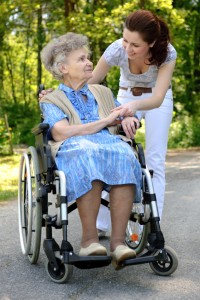Last week, we talked about how pain management is a vital component when it comes to senior care. Opioid painkillers have long been considered to be the standard for many types of pain relief, but there is plenty of research out there that shows that opioids can be deadly if used over a long period of time, or even misused over a short timeframe. However, some of the more effective alternative ways of treating pain are not covered by insurance policies in many states.
For example, take spinal cord stimulation. This is an extremely valuable method of treating chronic leg and back pain, but according to Blue Cross Blue Shield, one of the largest health insurance companies in the country, this is considered an experimental treatment, and is not covered by insurance in some states, particularly Tennessee and Pennsylvania. Even though it is very effective at what it does, and it avoids the potential for opioid abuse or any of the problems that come along with it, the treatment method doesn’t have the same widespread acceptance that opioids currently do.
This isn’t the only issue that is faced when dealing with pain management, but it is one of the more prominent examples. So, although the Centers for Disease Control strongly urges doctors all across the country to avoid opioids whenever possible in most cases, there are not quite enough avenues open to them to effectively do this, at least without being a huge cost to patients. And because most patients in this situation are often in low income situations, this isn’t a realistic outcome. Clearly, more time and attention by both researchers and bureaucrats is needed in this area so that a realistic, safe, and affordable method of pain control is arrived upon. It’s only a matter of time before this happens, but some mindsets will need to be changed, and a lot more research is still needed in order to provide effectiveness. Until then, search out other ways that you can help your parent to stay as pain free and safe as they can be.
Having a loved one that suffers from pain or is disabled puts a lot of strain on a family, particularly the lead family caregiver. If you find yourself in this situation, you do have alternatives. First, consult with a doctor on what you can do as a team to help manage pain without increasing the risk. They may recommend a whole range of different solutions, and if you have concerns about any of them, feel free to ask questions so that you can make the most informed decisions possible. Next, look for help in the caregiving realm. This might be a respite caregiver, or it might be hiring a professional in-home caregiver to administer care on a fulltime basis so that you can keep your job and your livelihood, all while still ensuring that you mom or dad is safe. If you are unsure about what the best type of senior care is for your loved one, this can be a question for their physician, too.
The post The Problem with Pain Management appeared first on Paradise In-Home Care.

No comments:
Post a Comment